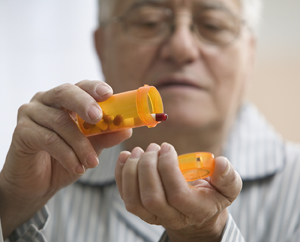Parkinson Disease: Tips for Taking Medicines
Parkinson Disease: Tips for Taking Medicines
Parkinson symptoms are much easier to manage with a good medicine routine. In particular, the timing of when medicines are taken can affect what activities are possible later on. You should also be aware that as the disease progresses your medicines may not work as well or as long as they did before. Your healthcare provider may prescribe different medicines. Or, you may need to take the same medicines more often.
Timing is important
Parkinson medicines can be a big help. But they may only work well for a certain amount of time before symptoms return. For best results, take medicines at the same time each day. It can also help to keep a medicine diary. Write down how long it takes for them to work, and how long it takes before symptoms return. If you have a smart phone, there are apps that can help keep track of your symptoms. This makes it easier to plan activities for times you’ll feel your best. It also helps your healthcare provider adjust your medicine when you're having problems.
Staying on track
Below are tips for taking medicines. If you have questions about your medicines, talk with your healthcare provider or pharmacist:
Use a pillbox or divided tray to keep track of medicines.
Take all your medicines. Don’t take one type and skip another.
Don't take levodopa at the same time you eat protein (such as meat or beans). Ask your healthcare provider which times are best.
Talk with your provider if you notice your medicines aren’t working as well.
Keep a list of your medicines and bring it to provider’s appointments.
Plan ahead. Refill prescriptions before they run out. Take medicines with you when you travel.
Tell your provider if you have problems swallowing pills.
Never change your dosage or stop taking medicine without talking to your healthcare provider.
Coping with side effects
You may have some side effects when you start taking medicines. This does not mean you should stop taking them. Instead, talk with your healthcare provider. Tell him or her about any side effects, such as nausea, lightheadedness, leg swelling, and sleep problems. Also tell your provider if any medicine causes confusion, hallucinations, or involuntary movements. Some people have an unusual desire to gamble or engage in other obsessive behaviors. Your provider may adjust the amount of medicine you take. Or, you may be given another type.
Updated:
February 24, 2018
Sources:
Dopamine Agonists and Pathologic Behaviors, Parkinson's Disease (2012), Parkinson's Disease: An Update. American Family Physician. Gazewood, John. 2013: Vol. 84, No. 4, pp. 267-273., Patient Education: Parkinson disease treatment options-medications (Beyond the Basics). UpToDate.
Reviewed By:
Sather, Rita, RN,Shelat, Amit, MD
